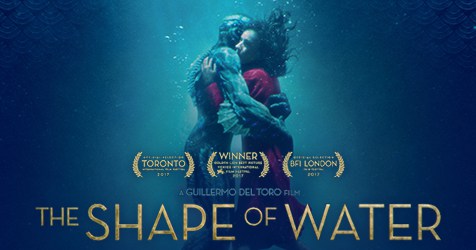Inspired by the 2018 Oscars and restricted to watching only Oscar-nominated films that my roommate had not already seen, I was introduced to director Guillermo del Toro’s “Shape of Water,” a film low on the list of Oscar-nominated films I had any interest in viewing.
Before Oscar night, “Shape of Water” had a slew of awards to its name. Among them were the awards for Best Original Score and Director at the Golden Globes and the BAFTA film award for Best Original Music as well as the The David Lean Award for Direction.
I had no idea what to think of this film when the credits first began to roll. The cinematography is definitely some of the most beautiful I’ve seen and the acting was incredible. The story line, however, can only be politely described as… unique.
In “Shape of Water” Eliza Esposito (Sally Hawkins) portrays a mute woman who works in a secure government facility and falls for an “Amphibian Man” (Doug Jones) who seems to be more fish than man. He needs water to live, cannot speak, only knows two words of sign language that Eliza taught him, is never given a name (which resulted in my roommate and I delighting in calling him ‘fishy-fishy’ during ethical debates resulting from our viewing of this film) and seems to be completely ruled by instinct. Eliza then frees him from the facility, falls in love with him and — this is where things get dicey and those morality questions started to come up — quite possibly rapes him.
To begin with, the cinematography was wonderful. Mimicking the algae in the pool where the “Amphibian Man” was forcibly held in the facility, and presumably the initial river he was found, the film was toned completely in green. This included costuming, the lighting, the walls, even the color of antagonist Colonel Strickland (Michael Shannon)’s car. It was beautiful to watch and the entire film was perfectly blocked with symmetry in each frame.
The characters were all immensely complicated, and the actors did an amazing job at bringing them to life. While this is something sought after in all films, the performances by the actors in “Shape of Water” are to be particularly commended due to the character’s natures — especially in the cases of Hawkins, Jones and Shannon.
Due to their mutism, Hawkins and Jones both had to portray their character’s wants, needs and internal characteristics through pure action. There are two primary exceptions to this. One is when Eliza fantasizes a retro-broadway musical scene during a mock stay-at-home dinner date with “Amphibian Man.” The second is when “Amphibian Man” signs the word for “egg,” learned due to Eliza giving him a hard-boiled egg while he was being starved and repeatedly signing the word – though whether he truly understood that this word specifically meant “egg” or if he used it generally for “food” is uncertain. Shannon, on the other hand, had a challenge in a very different way. His character was sickeningly sadistic. He joyously tortures “Amphibian Man,” presses a bloody hand over his wife’s begging mouth to stop her from talking during sex, is a murderess, racist, sexist, rude, and pointedly did not wash his hands after going to the bathroom. Yet, he pulled the character off perfectly which shows either amazing acting skills or a carefully hidden perverseness.
Now, the question of morality. Character Eliza sleeps with the “Amphibian Man” in her bathroom. As a film major, when we work on scripts, one of the main questions we are taught to ask ourselves is, “does it pay off?”, are the character’s actions supported by the characteristics the story has shown them to have leading up to this moment. In this case, I don’t think so. Eliza is a kind but lonely soul, searching for a meaningful connection with someone, so it makes sense for her to risk herself to save “Amphibian Man,” especially since she identifies with him due to their shared mutism. Then she falls in love with him and, again, this could pay off — until they have sex that borders on, if not crosses the line over to, rape. The “Amphibian Man” can not speak, so there was no way for him to give consent. He cannot communicate, so no one knows what he can or cannot understand or what he does or does not want. And, lastly, he is not human, so no one can even use a basic human understanding to understand him. Yet, Eliza has sex with him. Supporting this is that the only other sex scene in the film is between the Colonel and his wife and, during this scene, the Colonel is forcibly preventing his wife from speaking, despite her protests, and in this manner it parallels Eliza and “Amphibian Man’s” sex because they would also not be able to speak – and Eliza, like the Colonel, positions herself in the dominant position by initiating the physical intercourse. As Eliza is a kind and compassionate woman, who we become terrified of when the Colonel sexually confronts her at one point during the film, I do not think that it pays off for her to perform anything that could even remotely be seen as rape on another living creature.
All in all, “Shape of Water” was a bit too odd for my taste, but I am glad I watched it. I’m always up for some in-depth character debate, and parts of the film, despite it being categorized in the “horror” genre, were kind of funny. I’ll give this film 2.5/5 stars.


Leave a Reply